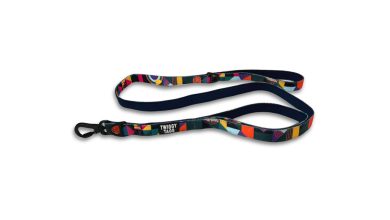- 30% respondents said competitive pricing would influence their decision when choosing a dog walker, compared to 86% respondents said additional services like training reinforcement or playtime are/would be important to them when choosing a dog walker.
- Over 4 in 5 (82%) respondents said professional affiliations or certifications would impact their decision to hire a dog walker, with just over a third (34%)saying it would significantly impact it.
- Almost all (97%) respondents said a dog walker’s experience and background in working with dogs would be important to them.
Around 78% of dog owners believe that their dog should be walked twice a day, making dog walking a valuable side hustle or even a full-time profession if you want to start a business and are passionate about dogs. According to Indeed, the average dog walker annual salary in 2023 is £23,216.
Money.co.uk dog walking business insurance experts wanted to explore what dog owners look for when hiring dog walkers, and how dog walkers can make themselves more attractive to their client base.
The study surveyed 2,000 people on concerns dog owners have when hiring dog walkers, as well as what they like about hiring a dog walker and found out the below:
What services do dog owners want a dog walker to provide?
One-on-one walks: Money.co.uk survey revealed that over half (52%) of dog owners prefer their dogs to go on one-on-one walks with a dog walker, as opposed to in a group – hence if you can offer this as a dog walker, it’s important to make this clear in all marketing you do.
Playtime and training: Furthermore, over 4 in 5 (86%) respondents said additional services like training reinforcement or playtime are important to them when choosing a dog walker. Considering adding this to your portfolio as a dog walker to entice clients and stand out from the competition.
Breed knowledge: Almost 9 in 10 (88%) respondents said they are likely to hire a dog walker who tailors services to their dog’s individual needs.
For example, over 7 in 10 (73%) respondents with a Cavalier King Charles Spaniel said a dog walker’s experience and background in working with dogs is extremely important to them, compared to just under 3 in 5 (59%) respondents with Golden Retrievers who said the same. Hence, things like knowing the key differences between breeds can therefore be highly valuable when securing potential clients.
What concerns do dog owners have when it comes to hiring a dog walker?
Dog owners surveyed would be most concerned about the safety of their dog when considering hiring a dog walker (44%), followed by the trustworthiness of the dog walker (27%).
Hence, having dog walking insurance is a surefire way to put worried dog owners at ease.
Over 9 in 10 (96%) respondents would place emphasis on a dog walker’s ability to handle emergencies or unexpected situations, and the key to dog walking insurance is public liability, which includes accident and injury cover. This covers dog walkers if the worst happens, for example if a dog is lost or injured during your care or if a dog causes an injury or accident to someone or someone else’s property.
What do dog owners look for in a dog walker?
According to the recent survey done by money.co.uk, the top three qualities or traits respondents prioritise most when looking for a dog walker are:
- Knowledgeable about dog behaviour (58%)
- Patience and understanding (55%)
- Punctuality and reliability (47%)
Top tips on starting up a dog walking business
Money.co.uk business insurance expert Cam Jaques gives his top tips for starting up a dog walking business:
Do your research:
Begin by researching your local market. Understand the demand for dog walking services in your area, your competition, and the rates they charge. Develop a solid business plan that outlines your goals, target market, pricing structure, and marketing strategies.
Get Dog Walking Insurance:
Dog walking insurance is an important part of setting up a dog walking business, as it helps to protect your business and the dogs you look after. Dog walking is not a risk-free business and there is a lot of emotional and financial responsibility attached to it.
The key to dog walking insurance is public liability, which includes accident and injury cover. This covers dog walkers if the worst happens, for example if a dog is lost or injured during your care or if a dog causes an injury or accident to someone or someone else’s property.
Ensure You Choose the Right Cover for You:
Identify the different levels of cover available to decide how much protection you need. It’s important to consider all aspects of the job, including whether you visit clients’ houses or use your own car.
You might also need employers’ liability insurance in your policy if you hire any staff. It’s also worth considering personal accident cover in case you suffer an injury during a walk or business equipment cover if you have specialist leads or dog toys. This can also cover the technology you use to manage booking with your clients, for example a laptop or phone. Speaking of tech, if you hold personal details of your clients online, then cyber insurance might also be useful.
Check Your Policy:
Dog walking insurance policies will not cover everything, including:
- Any animal scheduled under the Dangerous Wild Animals Act (DWAA)
- Any excess applicable
- Walking more dogs than is specifically outlined in the original policy
Hence, make sure you always check your own policy documents thoroughly for a full list of exclusions.
Legal Considerations:
Register your business, choose a suitable business name, and determine the legal requirements for operating a dog walking service in your area. This might include getting any necessary licenses, permits, or insurance coverage.
Training and Experience:
Gain relevant knowledge and experience in handling different dog breeds and temperaments. Consider taking dog training courses, first aid classes, and obtaining certifications in pet care to build your credibility and expertise.
Safety First:
Prioritise the safety of the dogs in your care. Ensure that you have a sturdy leash and collar, know basic dog body language, and have a plan for handling emergencies. Carry a basic first aid kit and have a list of emergency contacts, including the dogs’ owners and local veterinarians.
Building Trust:
Establish trust with your clients by being reliable, punctual, and consistent. Communicate effectively with pet owners, provide updates on walks, and address any concerns promptly. Building strong relationships with both dogs and their owners is key to your success.
Customised Services:
Tailor your services to meet the specific needs of each dog. Some dogs might require longer walks, individual attention, or specific care instructions. Offering personalised services can set you apart from competitors and make your clients feel valued.
Marketing and Branding:
Create a professional brand identity that reflects your values and services. Develop a user-friendly website, use social media platforms to showcase your work, and consider creating informative content about dog care to attract potential clients.
Networking:
Build a network within the local pet community. Partner with veterinarians, pet stores, groomers, and other pet-related businesses to get referrals and increase your visibility. Attending local dog-related events can also help you connect with potential clients.
Time Management:
Efficiently manage your schedule to accommodate multiple clients and their preferred walking times. Use scheduling tools or apps to keep track of appointments, routes, and special requests.
Continual Learning:
Stay updated on the latest trends and advancements in dog care and walking techniques. Attend workshops, read books, and follow industry blogs to enhance your skills and provide the best possible service to your furry clients.
Remember that starting a dog walking business requires dedication, patience, and a genuine love for dogs. By providing excellent care, building strong relationships, and continually improving your skills, you’ll be well on your way to a successful venture.






